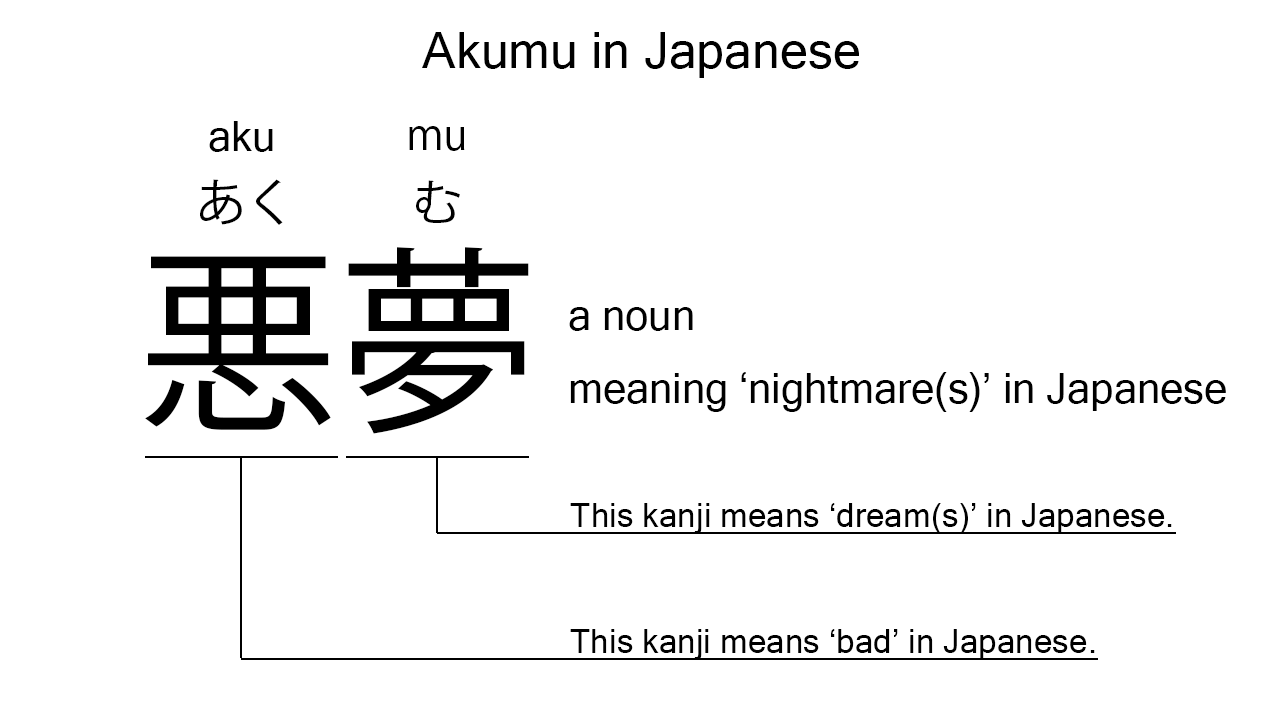What does “akumu” mean in Japanese?
Native speakers say “akumu” to mean ‘nightmare’ in Japanese. Perhaps, some Japanese learners know this word as it is sometimes used in Japanese movies, novels, manga, anime, and the like. In this blog post, however, I will explain this word in detail based on its kanji expression. And also, I will explain how to use it through example sentences. My explanations would help Japanese learners understand “akumu” more clearly. Then, let’s get started!
Contents
Definition and meanings of “akumu”
Let me start with the definition and meanings of “akumu”.
- akumu – 悪夢 (あくむ) : a noun meaning ‘nightmare’ or just ‘bad dream’ in Japanese. This can also work as plural. Learn more about Japanese plural.
Native speakers use this noun to refer to a nightmare or just bad dream in Japanese. In addition, they sometimes use this as a metaphor for a very bad event.
The definition and meanings are simple and clear, I think. To understand this noun more clearly, however, let me explain its kanji characters in detail, one by one.
Akumu in kanji
The kanji expression of “akumu” consists of the following two kanji characters:
- 悪 : a kanji character widely used to mean ‘bad’, ‘evil’, or such in Japanese.
- 夢 : a kanji character used to mean ‘dream’ in Japanese.
These two kanji characters tell us that “akumu” literally means a ‘bad dream’ in Japanese. What the kanji characters express is completely in line with the actual meanings.

When we meet new kanji expressions, we should check their kanji characters in detail to understand their meanings clearly and deeply. In many cases, kanji characters tell us a lot about the meanings of the expressions they form. Actually, here, we could get the better understanding of “akumu” through the detailed kanji check above.
So far, I’ve explained the definition and meanings of “akumu” together with its kanji characters. Then, let me explain how to use it through the example sentences below.
Example #1: how to say “nightmares” in Japanese
watashi wa tokidoki akumu wo miru – 私は時々悪夢を見る (わたしはときどきあくむをみる)
I sometimes have nightmares.
Below are the new words used in the example sentence.
- watashi – 私 (わたし) : a pronoun meaning ‘I’ in Japanese.
- wa – は : a binding particle working as a case marker or topic marker. In the example, this works after “watashi” to make the subject in the sentence.
- tokidoki – 時々 (ときどき) : an adverb of frequency meaning ‘sometimes’ in Japanese.
- wo – を : a case particle used to make the object word in a sentence. In the example, this is used after “akumu” to make the object in the sentence.
- miru – 見る (みる) : a verb meaning ‘to see’, ‘to watch’, ‘to look’, or such in Japanese.
This is a typical usage of “akumu”. In this example, it works as a part of the commonly-used phrase, “akumu wo miru”, which literally means ‘to see nightmares’ in Japanese. This phrase is normally translated into English as just ‘to have nightmares’, though. Anyway, when we want to say “nightmare” or just “bad dream” in Japanese, this noun is a very good option.
Example #2: another usage of “akumu”
kanojo wa kinou akumu wo mi ta to it ta – 彼女は昨日悪夢を見たと言った (かのじょはきのうあくむをみたといった)
She said that she had a nightmare yesterday.
Below are the new words used in the example sentence.
- kanojo – 彼女 (かのじょ) : a pronoun meaning ‘she’ in Japanese.
- kinou – 昨日 (きのう) : a noun meaning ‘yesterday’ in Japanese. This can also work as an adverb almost anywhere in a sentence. In the example, this works as an adverb to say “yesterday” in Japanese.
- mi – 見 (み) : one conjugation of the verb, “miru”, which was explained in the last example. In this example, it has been conjugated for the better connection with its following word.
- ta – た : an auxiliary verb used after a verb, adjective, or auxiliary verb to make its past tense form. In the example, this is used after “mi” to make its past tense form, “mi ta”, which means ‘to have seen’ in Japanese.
- to – と : a case particle working as a quote marker. In the example, this works after “kinou akumu wo mi ta” to indicate what “kanojo” said.
- it – 言っ (いっ) : one conjugation of the verb, “iu“, which means ‘to say’ in Japanese. In the example, it has been conjugated for the better connection with its following word.
- ta – た : the same as explained above. The second “ta” works after “it” to make its past tense form, “it ta”, which means ‘to have said’ in Japanese.
This is another typical usage of “akumu”. In this example, it works as a part of the commonly-used phrase, “akumu wo mi ta”, which literally means ‘to have seen a nightmare’ in Japanese. This phrase should be learnt together with its present tense form introduced in the last example.
Summary
In this blog post, I’ve explained the definition and meanings of “akumu” in detail based on its kanji expression. And also, I’ve explained how to use it through the example sentences. Let me summarize them as follows.
- akumu – 悪夢 (あくむ) : a noun meaning ‘nightmare’ or just ‘bad dream’ in Japanese. This can also work as plural. Native speakers use this noun to refer to a nightmare or just bad dream in Japanese. In addition, they sometimes use this as a metaphor for a very bad event. These two kanji characters literally mean a ‘bad dream’ in Japanese. What the kanji characters express is, therefore, completely in line with the actual meanings.
Hope my explanations are understandable and helpful for Japanese learners.